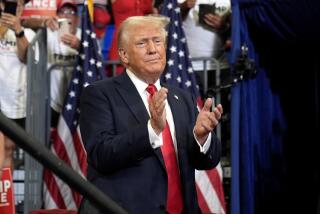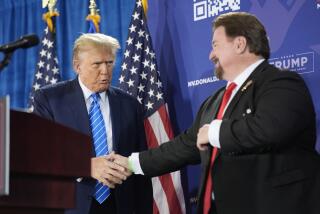Judge Drops Weinberger Perjury Count : Iran-Contra: Action may damage prosecutionâs case in the other felony charges against former defense secretary.
WASHINGTON â In a move that may significantly damage the prosecutionâs case against former Defense Secretary Caspar W. Weinberger, a federal judge Friday threw out a perjury indictment filed just six weeks ago, ruling the statute of limitations had expired on the charge.
The former Californian still faces trial Jan. 5 on four other felony counts in the Iran-Contra scandal, but the judgeâs ruling removes a major piece of evidence against him, his defense attorney said.
âThis knocks the heart and soul out of the governmentâs case,â Robert S. Bennett, Weinbergerâs chief defense counsel, said of the seven-page opinion handed down by U.S. District Judge Thomas F. Hogan.
In another development, Atty. Gen. William P. Barr rejected the demands of Senate Republicans and decided there was âno basisâ to appoint another independent counsel to investigate whether the filing of the charge was politically motivated. He agreed, however, to have his own investigators look into the matter.
The indictment in question, returned on Oct. 30, 4 1/2 months after the first, had been roundly criticized by congressional Republicans and campaign aides of President Bush because it cast Bush in an unfavorable light just four days before the election.
The charge, which prosecutors said was filed before the end of October simply to replace an earlier count dismissed by Judge Hogan, accused Weinberger of making a false statement to congressional investigators in June, 1987, when he denied taking notes of key meetings on the arms-for-hostages deals with Iran.
Extensive notes taken by Weinberger and obtained by prosecutors from among papers he turned over to the Library of Congress formed the basis for the charge against him.
The indictment said that among these notes were jottings taken at a Jan. 7, 1986, meeting at which then-President Ronald Reagan and his aides discussed trading arms to Iran in exchange for the release of U.S. hostages. The notes indicated that then-Vice President Bush attended the meeting and favored the exchange of arms for hostages.
The pre-election indictment, which was brought by independent counsel Lawrence E. Walsh, implied that Bush lied about his role in the Iranian arms sales because he long has denied taking any position on the deal. Bush has said he was âout of the loopâ on the discussions.
In his opinion, Hogan found the indictment legally flawed. Even though it purported to replace an earlier defective charge of âobstruction of Congress,â he said, it actually amounted to a new charge of making a false statement. The judge, in upholding the arguments of Bennett and his co-defense counsel, Carl S. Rauh, ruled that the belated count was filed too late.
The latest charge also was substantially different from the first one, Hogan said, because it was more specific and broader. It represented an improper âsubstantial amendment to the original charge of obstruction of Congress,â the judge said.
Hogan had dismissed the first charge because he found it faulty in light of an appellate court ruling in another case.
Although Bennett would not discuss the matter in any detail, other attorneys said Fridayâs ruling removes from the prosecutionâs case the strongest and most dramatic evidence against Weinberger--allegations that he sought to conceal from Congress the fact he had taken 1,700 pages of notes while serving in the Reagan Administration.
The remaining charges against the former defense secretary are more ordinary perjury counts that these legal sources said are easier to defend against. The questioning of him by Congress is subject to attack on grounds of vagueness, and Weinberger is expected to claim a lapse of memory in his answers to other questions, these sources said.
Barrâs decision not to seek an independent counsel to investigate Walshâs motives in bringing the new charge was in response to a formal request for such a probe from Minority Leader Bob Dole (R-Kan.) and other Republican members of the Senate Judiciary Committee, who felt the move was designed to harm Bush.
Barr, however, said Walsh is not among government officials covered by the soon-to-expire law governing such special investigations. In addition, the Justice Department itself could investigate Walshâs conduct without the need for a special counsel because there is no âpersonal, financial or political conflict of interestâ that requires an independent examination, he said.
Barr said he therefore would ask his own criminal division to look into the Republicansâ concerns and to âtake any appropriate action.â
More to Read
Get the L.A. Times Politics newsletter
Deeply reported insights into legislation, politics and policy from Sacramento, Washington and beyond. In your inbox three times per week.
You may occasionally receive promotional content from the Los Angeles Times.










